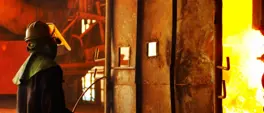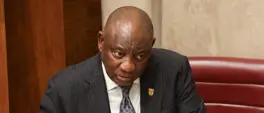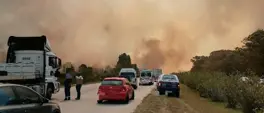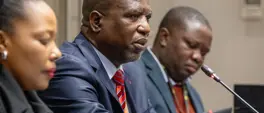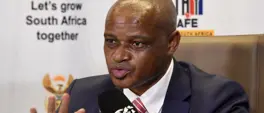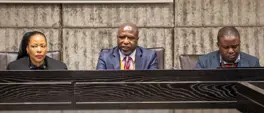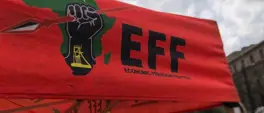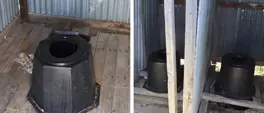MALAIKA MAHLATSI | Dear women: not participating in the GBV national shutdown is not a betrayal
Malaika Mahlatsi
21 November 2025 | 15:32"I did not participate in any way, for the simple reason that I am fatigued. In this moment, on this day, all the women in me are tired. I have nothing to give to the movement."
- National Shutdown
- Gender-based violence (GBV)
- Domestic violence
- 16 Days of Activism against gender-based violence
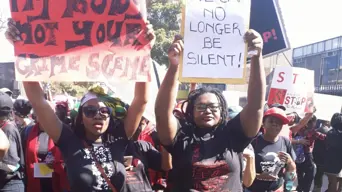
Photo taken at the National Shutdown on 1 August 2018, marching to the Union Buildings in Pretoria. Photo: Supplied
In the days leading up to today, the colour purple has been everywhere on social media. This is in support of a national shutdown driven by Women For Change.
The non-governmental organisation, founded in 2016, is one of South Africa’s most influential groups dedicated to combating gender-based violence and femicide (GBVF).
Guided by a mission to raise awareness, advocate and inspire meaningful change, Women For Change harnesses the power of social media to expose the GBVF epidemic confronting our country and to demand justice.
The organisation, taking advantage of the increased international attention on South Africa ahead of the G20 Leaders’ Summit in Johannesburg this weekend, called for a national shutdown on 21 November 2025 to bring attention to a crisis that is tearing South Africa apart.
The advocacy group launched a petition a few weeks ago, garnering over a million signatures. At the heart of its demands is for the government to declare GBVF a national disaster.
Speaking at the closing of the G20 Social Summit, President Cyril Ramaphosa insteaddeclared GBVF a national crisis.
The classification of GBVF as a national crisis rather than a national disaster has sparked criticism and concern from many NGOs working in the GBVF space, largely because the legislative instruments for responding to a crisis are far less robust than those put in place for a disaster.
A national disaster would allow the state to coordinate and manage the response across all spheres of government, with the national executive taking primary responsibility for implementation, including relief measures.
Crucially, a national disaster triggers specific funding mechanisms that allow for the release of emergency funds and resources. Many organisations fear that a national crisis declaration is inadequate for a problem the size and scale of GBVF in South Africa.
The scale of GBVF in South Africa is astronomical. Our country experiences one of the world’s highest levels of gender-based violence, with the rate at which women are killed five times higher than the global average.
The rate of sexual violence against women and children is unthinkable. Consider that more than 30,000 rape cases were recorded by the South African Police Service in the first three quarters of the 2024/2025 financial year alone.
Researchers and experts agree that the number is not a true reflection of the crisis, as many rape cases go unreported.
A study titled Rape Unresolved: Policing Sexual Offences in South Africa, conducted by Professor Dee Smythe at the University of Cape Town, lays this reality bare. It opens with a chilling paragraph that reads:
“More than 1000 women are raped in South Africa every day. Around 150 of those women will report the crime to the police. Fewer than 30 of the cases will be prosecuted and no more than 10 will result in a conviction. This translates into an overall conviction rate of 4-8 percent of reported cases. What happens to all the other cases?”
This is the reality for many women, brutally raped and denied justice. It is for this reason that today’s Women’s Shutdown is relevant and important.
But it is equallyimportant to recognise that while sexual violence, murder, attempted murder and intimate partner violence often receive attention, other forms of GBV also exist.
These include psychological and emotional violence, non-physical abuse that is dehumanising and degrading, such as coercion, verbal abuse, blackmail, intimidation, stalking, restricting freedom of movement, and isolating a person from their support network.
ALSO READ: MALAIKA MAHLATSI | The rise of political celebrities and the appeal of the lowest common denominator
MALAIKA MAHLATSI | Remembering the women who history has erased, shamed and rendered invisible
Another form is socio-economic violence, which manifests in thedenial of access to essential resources, services, information, education and work. Restrictions on economic rights also extend to the gender pay gap and other forms of exploitation that trap victims in cycles of poverty and abuse. GBV also includes the epistemic violence that women scholars experience in the intellectual space.
Epistemic violence, the harm done through the suppression or devaluation of their knowledge, experiencesand ways of knowing, has caused untold damage to Black women and communities in particular.
When GBV is understood in this comprehensive way, the extent of the catastrophe becomes clearer. It illustrates that even women who are not killed or sexually assaulted do not escape the horrors of GBV. And herein lies my contention: women who opted out of participating in today’s Women’s Shutdown should not be labelled sellouts or deemed less committed to the cause.
Millions of women in our country endure abuse at the hands of men and within a normative heteropatriarchal system that has made our lives unbearable. Just surviving a single day is a blessing because no place is sacred when it comes to GBV.
Women are raped and killed in their homes, in public transport, in the workplace, at social events, in churches, schools, shopping centres, public parks, police cells - every place imaginable and unimaginable.
Not a single space is safe for any woman, from an nfant to a pensioner. This makes GBV not merely a headline or a trending hashtag but a lived reality for millions of women across rural and urban South Africa.
In such an environment, GBV is not a trauma that women simply endure and overcome; it is ongoing, made perpetual by the constant and ever-present triggers we encounter daily. I do not know a single woman who has not been affected by GBV, directly or indirectly.
For decades, women have signed petitions, marched, protested, and done everything humanly possible to shine a spotlight on the GBVF catastrophe in South Africa. As a child, I witnessed my late mother, then the Communication Support Officer at the South African NGO Coalition (SANGOCO), participate in countless initiatives.
I too, in my teens, twenties and now my thirties, have protested, signed petitions, written articles, and done everything I can to contribute to the cause. Today, my nieces are engaging in this work, their childhoods interrupted by the same scourge that shaped my mother’s life as a social justice activist, and mine too.
It is soul-crushing to realise how little has changed despite the many efforts women have led for decades. And these women are not living in a parallel universe.
They are victims and survivors who, instead of being given space to grieve stolen childhoods, shattered dreams and broken lives, must also find the strength to continue participating and setting themselves on fire to keep the struggle warm. It is a brutal demand to make of women.
This endless cycle of trauma and re-victimisation, not only when perpetrators go unpunished, but also when we are forced to relive our own wounds every time another woman is raped, killed, mutilated, cyberbullied, beaten, insulted or degraded is psychologically haemorrhaging.
I have been off social media for over six months and have recently begun limiting my exposure to news about GBVF. This is not because I do not care, how could I not, as a survivor? It is because I owe myself the compassion that society routinely denies me.
Sometimes, that compassion means not participating in protests, marches, discussions changing my profile picture in memory of yet another murdered woman, or signing petitions demanding a state of disaster declaration from a government that has, for a decade, insisted GBVF does not meet the criteria, even as bodies pile up and little girls walk home with blood between their legs and bruises on their small buttocks.
This was the approach I took in the weeks leading up to the Women’s Shutdown.
I did not participate in any way, for the simple reason that I am fatigued. In this moment, on this day, all the women in me are tired. I have nothing to give to the movement.
I have nothing left for myself or any other woman. I am tired and for once, I am allowing myself to feel this without fear that refusing more trauma makes me less committed to the cause.
Those who can still continue, who are stronger today, must continue the fight. We will reconnect when we have gathered strength. For now, as cities and towns are painted purple and the nation shuts down for GBVF, I am choosing to shut down for my mental and emotional health.
I do this with confidence that my true comrades will extend grace and compassion, understanding that opting out is not selfishness or betrayal, it is a radical act of self-preservation.
It is an act for which no woman should ever have to apologise.
Malaika is a geographer and researcher at the University of South Africa, with expertise in water governance and urban planning. She is a PhD in Geography candidate at the University of Bayreuth in Germany.
Get the whole picture 💡
Take a look at the topic timeline for all related articles.

